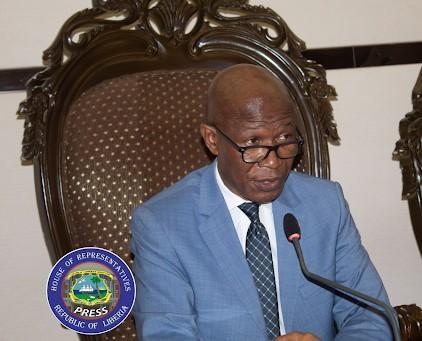Liberia: House Convenes at Night to Approve Bea Mountain Concession

Speaker Bhofal Chamber presiding over the special session that concluded with the crucial House decision
.... The agreement, signed between the government and Bea Mountain Mining Corporation, is expected to grant the mining company exclusive mineral exploitation rights and significant tax incentives for the coming quarter-century for an investment of US$520 million in mining operations by June 2024 while creating hundreds of additional jobs.
The House of Representatives has ratified the Bea Mountain 25-year mineral development agreement in a surprising late-night decision Despite assurances of a thorough review process.
The House, which is notorious for the speedy passage of investment agreements, made the decision just a few days after the Senate, within a remarkably short timeframe, swiftly approved the President George Weah administration’s request for an extension of the company concession agreement to 2051.
The agreement, signed between the government and Bea Mountain Mining Corporation, is expected to grant the mining company exclusive mineral exploitation rights and significant tax incentives for the coming quarter-century for an investment of US$520 million in mining operations by June 2024 while creating hundreds of additional jobs.
The company which is a subsidiary of Avesoro Resources, got its first concession agreement for gold extraction from Western Liberia in 2001, with a lifespan of up to 2026 but the agreement has been elongated to 2051.
This comes after the House Joint Committee on Natural Resources and Concessions, which is headed by Rep. Clarence Massaquoi had on September 4, promised a thorough review of the Company over the past decades.
The Massaquoi Committee even went as far as requesting Bea Mountain to submit in a matter of days the Company’s list of shipments for the past six months; clarity on the number of Liberian citizens employed; the issue of local contents, as well as an overall performance report, among others.
However, it is not clear as to whether the documents requested by the House were ever made available as the Committee has yet to release a report about the company.
“The House will do nothing to compromise the interest of the people,” Massaquoi said at the opening of a public hearing on Sept. 4. “As such, the committee will scrutinize the mineral development agreement properly, involving the public participation including the community or county in which the concessionaires operate.”
The promise of the public hearing, which was also intended to give civil society groups and stakeholders from affected communities the chance to vigorously participate in the review of the restated agreement and share their concerns, opinions, and suggestions did not materialize as well.
The house decision which was made in the last hours as it closed its special sessions yesterday had given Weah and his party a big legislative victory just 34 days before the crucial October 10 elections.
A total number of 37 Representatives voted in favor of concurrence with the attendance of 39 out of 73 members, according to the Chief Clerk’s record.
Critics of the House decision argue that 25 years is a significant period, and a deal of such magnitude should undergo a rigorous review process to ensure the best possible outcome for the nation.
Some speculate that external pressures or hidden agendas influenced the decision-making process, while others argue that the interests of powerful individuals or entities took precedence over the welfare of the Liberian people.
Transparency and accountability have been consistent demands from citizens and civil society organizations throughout Liberia's history. But the ratification of the Bea Mountain agreement in such circumstances only adds fuel to the fire.
Bea Mountain, whose activities mainly focus on gold extraction, has been a significant player in Liberia’s mining sector, but its operations have increasingly been overshadowed by environmental concerns including land degradation, water pollution, and health issues.
